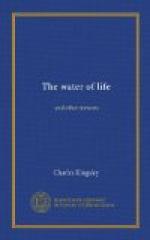all creation: but our notion is this—that
this world is a machine, which would go on very well
by itself, if God would but leave it alone; that if
the course of nature, as we atheistically call it,
is not interfered with, then suns shine, crops grow,
trade flourishes, and all is well, because God does
not visit the earth. Ah! blind that we are; blind
to the power and glory of God which is around us,
giving life and breath to all things,—God,
without whom not a sparrow falls to the ground,—
God, who visiteth the earth, and maketh it very plenteous,—God,
who giveth to all liberally, and upbraideth not,—God,
whose ever-creating and ever-sustaining Spirit is
the source, not only of all goodness, virtue, knowledge,
but of all life, health, order, fertility. We
see not God’s witness in His sending rain and
fruitful seasons, filling our hearts with food and
gladness. And then comes the punishment.
Because we will not keep up a wholesome and trustful
belief in God in prosperity, we are awakened out of
our dream of unbelief, to an unwholesome and mistrustful
belief in Him in adversity. Because we will
not believe in a God of love and order, we grow to
believe in a God of anger and disorder. Because
we will not fear a God who sends fruitful seasons,
we are grown to dread a God who sends famine and pestilence.
Because we will not believe in the Father in heaven,
we grow to believe in a destroyer who visits from
heaven. But we believe in Him only as the destroyer.
We have forgotten that He is the Giver, the Creator,
the Redeemer. We look on His visitations as
something dark and ugly, instead of rejoicing in the
thought of God’s presence, as we should, if we
had remembered that He was about our path and about
our bed, and spying out all our ways, whether for
joy or for sorrow. We shrink at the thought of
His presence. We look on His visitations as
things not to be understood; not to be searched out
in childlike humility—and yet in childlike
confidence—that we may understand why they
are sent, and what useful lesson our Father means
us to learn from them: but we look on them as
things to be merely prayed against, if by any means
God will, as soon as possible, cease to visit us,
and leave us to ourselves, for we can earn our own
bread comfortably enough, if it were not for His interference
and visitations. We are too like the Gadarenes
of old, to whom it mattered little that the Lord had
restored the madman to health and reason, if He caused
their swine to perish in the lake. They were
uneasy and terrified at such visitations of God incarnate.
He seemed to them a terrible and dangerous Being, and
they besought Him to depart out of their coasts.




